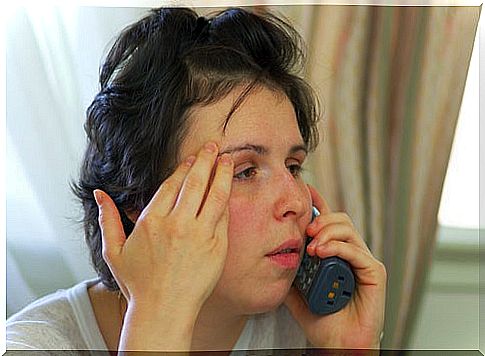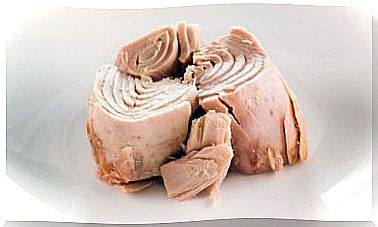9 Misleading Feelings Of Hunger
Many times we eat because we confuse the feelings. It is likely that we are only thirsty, or we may even eat out of boredom, so it is advisable to check it before eating without measure.
The feeling of being hungry can occur shortly after eating, or in the hours between meals. However, this does not necessarily mean that our body is asking us to provide more nutrients.
Sometimes the problem is that we can misinterpret the body’s interoceptive signals and confuse them with the feeling of being hungry. In this way, in this article we will present you 9 situations that make you believe that you are hungry (when in reality you are not).
9 sensations that make you think you’re hungry
1. You didn’t get enough sleep the night before

Have you noticed your stomach growling on the days the alarm went off long before you were ready to face the morning? This is due to lack of sleep, which has been linked to higher levels of the hormone ghrelin, which is responsible for triggering hunger.
And to make matters worse, when you are sleep deprived, you generally crave calorie-laden foods as your body searches for alternative sources of energy. The researchers believe this could be a clue to why people who regularly sleep little are at a higher risk for obesity.
2. You ate too much yesterday
Science does not have an exact explanation for this feeling. However, it cannot be denied that the occasional feeling of going to bed full and waking up hungry is very common.
Contrary to popular belief, it is not that your stomach actually expands, it is probably more a consequence of the type of food we ate for dinner.
If you went over the top on starches the night before, this could trigger dramatic swings in blood sugar that would trick the brain into thinking you’re not full yet.
3. You are in the premenstrual stage
Many women know that this is intuitively true. While some studies point to a link between PMS and sweet cravings, there is no strong evidence to back up binge-eating.
During the premenstrual phase, there is an increase in progesterone production. This would seem to increase not only appetite, but also general dissatisfaction with one’s own body. Interestingly, the animals would also follow a similar pattern. Therefore, it seems a common mechanism for all mammals.
4. You could have had a better breakfast

Did you know that eating badly for breakfast could upset you for a whole day? A 2013 study has suggested that one of the most important components for a proper breakfast is protein. People who ate high-protein breakfasts were less likely to eat fatty and sugary foods for the rest of the day.
You may also be eating very little fiber or fat, both of which help keep you full. Or, maybe you just eat too little for breakfast.
A cereal bar or a piece of fruit is undoubtedly a quick and easy option for the mornings to rush out the door. However, consuming 300 to 400 calories is much better to keep you satisfied until lunch.
5. You take certain medications
Medications may stimulate your appetite. In the last 20 years, the number of medications that have a side effect has increased from one in ten to one in four.
In some cases, as soon as treatment is complete, your appetite will return to normal. However, for chronic conditions that require lifelong medication, it is wise to discuss medication options with your doctor. It could be a similar drug with fewer side effects.
6. You have the habit of consuming soft drinks
A sugary drink stimulates insulin production. This sudden production of insulin would promote the feeling of hunger, as claimed by old research. Therefore, you will need to satiate this urge with food. If you limit your consumption of soda, you will probably notice a welcome difference.
7. You’re really just thirsty
A little dehydration can make you feel fatigued. In this way, just like when you are sleep deprived, the body feels that it needs calories for fuel. That means you can experience what you think is hunger, when in reality you are thirsty.
Experts often suggest drinking a glass of water and then waiting a few minutes before giving in to a food craving. To help distinguish hunger from thirst, imagine a large meal. If it doesn’t sound appealing, drink some water instead.
8. You are bored

Much of what we do in life is powered by dopamine, a chemical messenger in the brain related to motivation, encouragement, and reward. On a biological level, dopamine makes us feel good when we eat, so we like to do it.
Thus, when nothing interesting happens to us, the brain looks for a way to stimulate the production of dopamine to “save us from boredom.” Therefore, look for a source of emotions and, of course, food is one of them. If that’s what happens to you, it’s best to distract yourself. So enjoy a good book, listen to your favorite music, meditate, exercise, etc.
9. You are stressed
Our natural stress response is an evolutionary tactic to help us avoid becoming someone else’s dinner party. Faced with stress, the body may need to stock up on nutrients.
Activation of the limbic system provides for a future fight-flight situation. Therefore, the brain activates the mechanisms necessary to stimulate appetite. Additionally, cravings tend to focus on the most fatty and sugary foods. So the next time you feel stressed, try to relax before trying to relax by eating.
Conclution
In conclusion, and as paradoxical as it may seem, being hungry is not always an indication that your body needs more food. On the contrary, on many occasions there are times when we do not know how to discriminate well which stimuli are those that trigger hunger and which ones do not.









